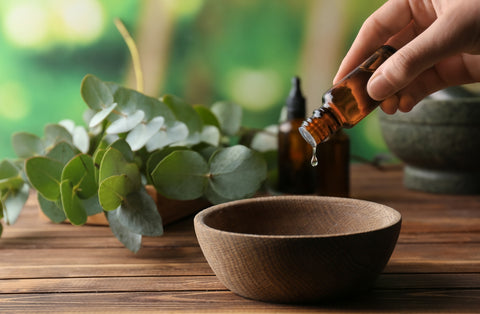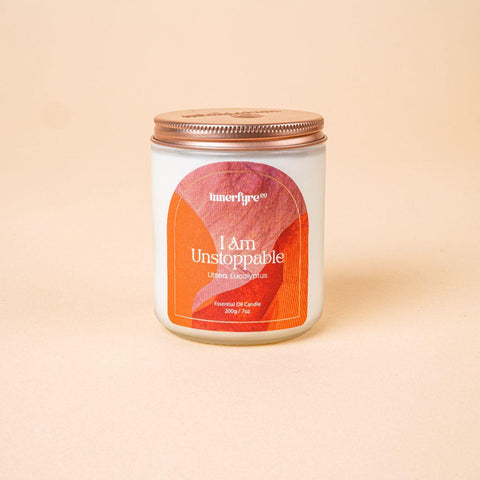
Eucalyptus Essential Oil- Benefits, Uses, and Origin
If you’ve ever rubbed your chest with a soothing balm when you had a cough, or walked into a spa and instantly felt your sinuses clear — chances are, you’ve already met eucalyptus essential oil.
Its cool, minty scent is as refreshing as it is comforting, and it’s been a go-to remedy for generations.
But beyond helping you breathe easier, this powerful oil has a lot more to offer — from cleansing the air to calming the mind.
Eucalyptus essential oil is one of the world's most versatile oil. Aside from being loved for its scent, it is widely used for its countless medicinal properties.

The Eucalyptus Tree
Eucalyptus is a tree species from the Myrtaceae family native to Australia.
Commonly known as gumtree, these fast-growing trees are of high economic importance. It is characterized by having flaky, outermost barks. Eucalyptus leaves are leathery in texture.
Eucalyptus leaves are where the essential oil comes from. These leaves are dried and crushed before it undergoes distillation to release the essential oil. Eucalyptus essential oil is a common ingredient in medicines that treat respiratory symptoms such as cough symptoms, nasal congestion, common cold, and even asthma.
It is the key ingredient that gives rubs its camphor scent.

Components of Eucalyptus Oil
The eucalyptus essential oil derived from the tree’s dried leaves is a colourless oil with a heavy minty, citrus scent. Some of the major components of eucalyptus oil are cineol, pinene and limonene. They give the essential oil the strong, minty odour.
Aside from the components mentioned above, the oil may also contain around 250 other more phytochemical compounds in different concentrations depending on the species.
Various species of eucalyptus yield essential oils used for different occasions and purpose. It is important to note the different eucalyptus species and how they should be used.
Eucalyptus globulus var. globulus
(Common name: blue gum, Tasmanian blue gum, fever tree)
This is the most common type of eucalyptus species where the essential oil is derived. The oil harvested from the distilled eucalyptus leaves and twigs have a camphoraceous aroma, which works well in relieving coughs, colds, and asthma. Thanks to the high oxide content (cineole- 52.96%), it is a big help in aiding against respiratory ailments.
It has an uplifting effect when inhaled and has excellent anti-inflammatory, antiseptic, and anti-fungal properties
Eucalyptus dives
(Common name: broad-leaved peppermint eucalyptus, blue peppermint tree)
The distinct blue heart-shaped eucalyptus leaves of the blue peppermint tree are where its name was derived. It has a combination of camphor and minty scent, good for some respiratory problems such as coughs and colds. It also relieves the symptoms of arthritis and can increase mental alertness.
Eucalyptus smithii
(Common name: gully gum, gully peppermint, blackbutt peppermint, ironbark peppermint)
The greyish-green eucalyptus leaves of the gully gum are where the camphoraceous aroma is from. Oxide, being its key component, makes it perfect for aromatherapy in treating respiratory conditions and eases headaches and muscle pain.
Eucalyptus citriodora
(Common name: lemon-scented eucalyptus)
The lemon-scented eucalyptus, a cross between a eucalyptus and a citrus tree, gives a more citrus scent because of the higher concentration of limonene combined with the unique camphor odour given off by other eucalyptus species. It is calming and works well in relieving symptoms of cold and flu.
This eucalyptus essential oil is favoured over other ones when used in children.
Eucalyptus radiata
(Common name: narrow-leaved peppermint)
A powerful variant of eucalyptus essential oil, the Eucalyptus radiata has very effective anti-inflammatory, antibacterial, and antifungal properties. This is because of the higher cineole content compared to the globulus variety. Its fresh and camphorous scent uplifts the mood and soothes exhaustion.
History of the Use of the Eucalyptus Oil
Although already famous with the Aborigines, it was Baron Ferdinand von Müller who discovered its antiseptic properties.
It was used to treat several ailments, including malarial fevers. Its medicinal properties paved the way for the export of eucalyptus seeds from Australia to different parts of the world. The popularity of the eucalyptus essential oil started during World War I, when it was used to treat meningitis during the influenza pandemic of 1919.

Benefits of Eucalyptus Essential Oil
It’s amazing how one little bottle can do so much.
Eucalyptus essential oil is known for its crisp, cooling aroma — but beyond that refreshing scent lies a host of natural benefits. Whether you’re looking to breathe easier, focus better, or soothe tired muscles, this versatile oil has something to offer for both body and mind.
Here are some of its most popular uses and why it deserves a spot in your wellness routine:
Relieves headaches
That cooling sensation you feel when using eucalyptus oil isn’t just refreshing — it can actually help ease headaches and tension.
Try adding a few drops to a damp cloth, then place it on your forehead, temples, or the back of your neck. The soothing aroma and cooling effect can help release built-up tension and relax facial muscles.
For respiratory support
If you’ve ever used a chest rub like Vicks, you’ve already experienced the power of eucalyptus oil. Its natural decongestant and expectorant properties make it a go-to for coughs, colds, and stuffy noses.
Add a few drops to hot water for steam inhalation, or combine it with peppermint and lemon essential oils for an even more invigorating blend that helps clear your airways and ease congestion.
Boosts focus
Eucalyptus isn’t just for sick days — its crisp, uplifting scent can also help sharpen your mind. Diffuse it while working or studying to clear mental fog and create a refreshing atmosphere.
Pro-tip: Lavender oil can be mixed with eucalyptus oil and used in a diffuser, leaving an energising aroma in the room.
Eases joint and muscle pain
After a long day or an intense workout, eucalyptus essential oil can offer relief for tired muscles.
Thanks to its natural anti-inflammatory properties, it’s often found in ointments and balms for back pain, arthritis, or muscle soreness. Mix a few drops with a carrier oil like coconut or jojoba, then gently massage it into affected areas for a cooling, soothing effect.
For insect bites and cuts
Known for its antiseptic qualities, eucalyptus oil can help soothe insect bites, small wounds, and skin irritations while preventing infection.
It also doubles as a natural insect repellent — perfect for those outdoor days when you want protection without harsh chemicals.
Helps with cold sores
With its anti-inflammatory and antimicrobial benefits, eucalyptus essential oil can help calm the discomfort and reduce the swelling that comes with cold sores.
Just remember to dilute it properly before applying it to sensitive areas.
For dental support
There’s a reason eucalyptus oil is found in many toothpaste and mouthwash formulas — it helps fight bacteria and freshen breath.
Mix a drop with a glass of water to create your own natural mouth rinse (just don’t swallow!).
To fight dandruff and stimulate the scalp
Struggling with dandruff or an itchy scalp?
Add a drop or two of eucalyptus essential oil to your shampoo, or mix it with coconut oil for a scalp massage. Its antifungal properties can help balance your scalp while leaving that clean, fresh feeling after every wash.
Relieves sunburn
A few drops of eucalyptus oil mixed with aloe vera gel or water can make a soothing spray for sun-exposed skin. It cools, hydrates, and refreshes — a perfect natural remedy for hot, summer days.
Controls blood sugar
Preliminary studies suggest eucalyptus essential oil may play a role in supporting healthy blood sugar levels. However, more research is needed — so think of it as a complementary wellness boost, not a replacement for medical treatment.
Safety Tips and Precautions
Much like other essential oils, using an incorrect dose of this oil may bring more harm than good.
Consuming eucalyptus essential oil in small amounts such as those found in food is considered safe.
But when not properly diluted, it can be fatal.
Ingesting too much can cause stomach pain, dizziness, seizures, and coma. It can also induce vomiting and diarrhea.
If applied to the skin, eucalyptus oil should first be diluted to prevent the occurrence of skin irritation.
Note that eucalyptus oil is not recommended to be used by children as it has side-effects, especially for infants.
For people to undergo surgery, since eucalyptus has the potential to affect blood sugar levels, it is advised to avoid using it 2 weeks before an operation.
Frequently Asked Questions
Is eucalyptus essential oil safe to use directly on skin?
It’s best to dilute eucalyptus essential oil with a carrier oil like coconut or jojoba before applying it to the skin. A patch test is always recommended to avoid irritation.
Can I use eucalyptus essential oil around children or pets?
Use with caution — always diffuse in well-ventilated spaces and avoid direct contact or ingestion. Keep it out of reach of kids and pets.
Can I use eucalyptus essential oil every day?
Yes, but moderation is key. Diffuse it for short periods or add a few drops to your bath or massage oil when you need a boost.
Does eucalyptus essential oil help with colds?
It can help ease congestion and open airways, making it a comforting natural remedy during cold and flu season — though it shouldn’t replace medical treatment.
Conclusion: Breathe Deep, Feel Refreshed
From clearing your mind to easing your breath, eucalyptus essential oil is truly nature’s refresh button — a simple way to find calm and clarity in your everyday routine.
Whether you use it to unwind after a long day or to lift your energy in the morning, its crisp, cooling scent reminds you to pause and take a deeper breath.
Discover the uplifting power of eucalyptus in our collection of candles, shower steamers, and room sprays — thoughtfully crafted to bring that spa-fresh feeling right into your home.


